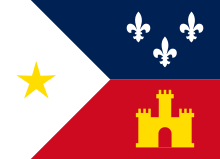
Back Cajuns Afrikaans كاجون ARZ Cajún AST کیجنلر AZB Каджуны Byelorussian Cajuns Catalan Cajunové Czech Cajuns Welsh Cajun (etnisk) Danish Cajun (Bevölkerungsgruppe) German
 | |
| Total population | |
|---|---|
| 1.2 million (2002 estimate)[2] | |
| Regions with significant populations | |
| Languages | |
| French (Louisiana French) English (Cajun English) Franglais Spanish (Isleño Spanish) Frespañol Louisiana Creole | |
| Religion | |
| Christianity: Predominantly Roman Catholicism | |
| Related ethnic groups | |
| Acadians, French Louisianians, French-Canadian Americans, Louisiana Creoles, Isleños, Haitians, Creoles of color, St. Dominicans |
| Part of a series of articles on the |
| French people |
|---|
 |
The Cajuns (/ˈkeɪdʒənz/; French: les Cadjins [le kadʒɛ̃] or les Cadiens [le kadjɛ̃]), also known as Louisiana Acadians (French: les Acadiens),[3] are a Louisiana French ethnicity mainly found in the U.S. state of Louisiana and surrounding Gulf Coast states.
While Cajuns are usually described as the descendants of the Acadian exiles who went to Louisiana over the course of Le Grand Dérangement, Louisianians frequently use Cajun as a broad cultural term (particularly when referencing Acadiana) without necessitating race or descent from the deported Acadians. Although the terms Cajun and Creole today are often portrayed as separate identities, Louisianians of Acadian descent have historically been known as, and are, a subset of Creoles (Synonymous for "Louisianais", which is a demonym for French Louisianians).[4] Cajuns make up a significant portion of south Louisiana's population and have had an enormous impact on the state's culture.[5]
While Lower Louisiana had been settled by French colonists since the late 17th century, many Cajuns trace their roots to the influx of Acadian settlers after the Great Expulsion from their homeland during the French and British hostilities prior to the French and Indian War (1756 to 1763). The Acadia region to which many modern Cajuns trace their origin consisted largely of what are now Nova Scotia, New Brunswick, Prince Edward Island plus parts of eastern Quebec and northern Maine.
Since their establishment in Louisiana, the Cajuns have become famous for their French dialect, Louisiana French, and have developed a rich culture including folkways, music, and cuisine. Acadiana is heavily associated with them.[6]
- ^ Sara Le Menestrel (2014). Negotiating Difference in French Louisiana Music: Categories, Stereotypes, and Identifications. Univ. Press of Mississippi. p. 23. ISBN 978-1-62674-372-4.
- ^ James Minahan (January 1, 2002). Encyclopedia of the Stateless Nations: A-C. Greenwood Publishing Group. p. 355. ISBN 978-0-313-32109-2.
- ^ Valdman, Albert; Kevin J. Rottet, eds. (2009). Dictionary of Louisiana French: As Spoken in Cajun, Creole, and American Indian Communities. University Press of Mississippi. p. 98. ISBN 978-1-60473-404-1.
- ^ Landry, Christophe (January 2016). A Creole Melting Pot: the Politics of Language, Race, and Identity in southwest Louisiana, 1918-45 (Doctorate of Philosophy in History).
- ^ Brasseaux, Carl A. (1992). Acadian to Cajun: Transformation of a People. Jackson, Miss.: University Press of Mississippi. ISBN 0-87805-583-5.
- ^ Cecyle Trepanier, "The Cajunization of French Louisiana: forging a regional identity". Geographical Journal (1991): 161-171.
© MMXXIII Rich X Search. We shall prevail. All rights reserved. Rich X Search